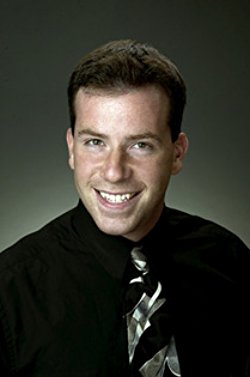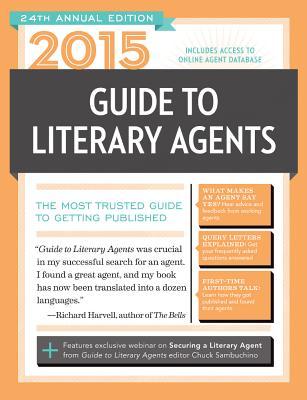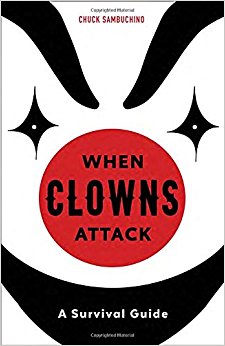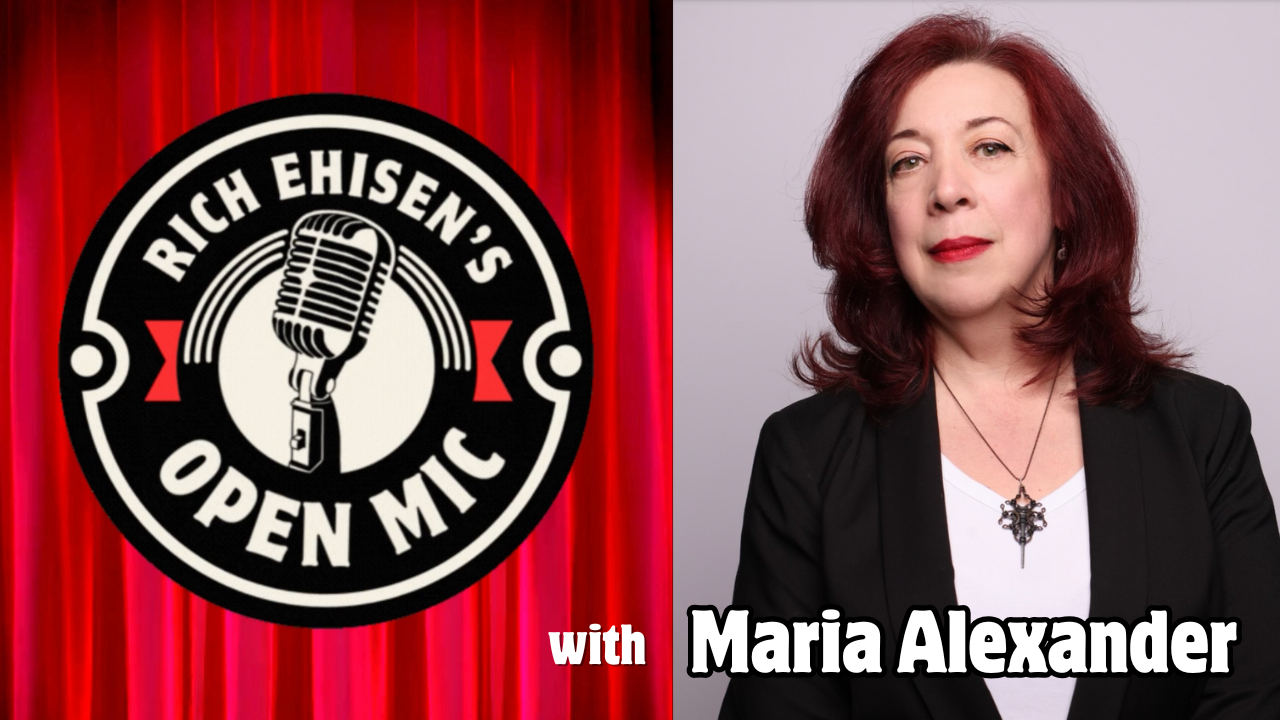Many aspiring authors know Chuck Sambuchino from his time at Writer’s Digest, where for many years he was the editor of the publication’s indispensable annual  “Guide to Literary Agents.” When he was not helping others find an agent, Chuck was also a pretty successful author himself, penning the hilarious “How to Survive A Garden Gnome Attack” and “When Clowns Attack” among his many books. This year he left WD and struck out on his own, drawing on his extensive background as a reporter, author, editor, playwright and speaker to help writers on their own path to success. We caught up with him recently to learn more about his new gig and how he helps writers looking to help themselves.
“Guide to Literary Agents.” When he was not helping others find an agent, Chuck was also a pretty successful author himself, penning the hilarious “How to Survive A Garden Gnome Attack” and “When Clowns Attack” among his many books. This year he left WD and struck out on his own, drawing on his extensive background as a reporter, author, editor, playwright and speaker to help writers on their own path to success. We caught up with him recently to learn more about his new gig and how he helps writers looking to help themselves.
Open Mic: You’ve worn a lot of hats in this business: reporter, editor, blogger, author, speaker, playwright…it kind of boggles the mind. And of course many folks know you from your many years at Writer’s Digest, which you recently left. Give me the latest on your new venture as a freelance editor and speaker.
Sambuchino: I’m doing a lot of the same things now — just on my own as a writing/editing freelancer. I’m doing a lot of query and manuscript editing for writers, and also a lot of teaching at writers conferences. I’m enjoying the slower pace right now, but expect in the next year I’ll take on a new gig blogging somewhere about agents, just like before. The freelance life is everything I’ve hoped it would be, and more. I don’t set an alarm most mornings. That’s nice. I no longer blog for Writer’s Digest, so people can find me at ChuckSambuchino.com or on Twitter at @chucksambuchino.
Open Mic: Even if they don’t always admit it, most writers know the importance of a really good editor. But like many aspiring authors I’m leery of spending a lot of money with someone I may or may not click with. What should someone like me look for if they decide to seek out a freelance editor?
Sambuchino:
- Seek referrals from people you know and trust. Join writing groups and ask those other writers who they’ve worked with. Basic questions will work: “Have you worked with a freelance editor? What did they charge? Were you happy with the work you got?” Etc.
- Get a test edit of some kind. Many new freelance editors will edit a few of your pages for free, in an effort to get you to say yes and engage in a deal. With my edits, most clients engage in a Test Edit (trial edit) first, where they pay me to edit the first 40 pages of their work. This allows them to review the critique and decide if they want a full edit. It also protects me in that if I feel no connection with the work I can stop at 40 pages. This seems to work well.
- Seek success stories, not just testimonials. A testimonial looks like this: “Chuck edited my work and he was great.” A success story looks like this: “Chuck edited my work and he was great, and I got a literary agent afterward.” Testimonials are a dime a dozen. Success stories are the real deal.
Open Mic: How many clients are you able to work with at a time? Do you have a set limit for yourself?
Sambuchino: For query and synopsis edits, I don’t set a limit. I take on anything people throw at me. Sometimes this makes for very late nights. But with manuscript edits (either partials or fulls), yes I have limits depending on my schedule. The exact number of clients in my queue at any given time depends on the length of their projects and my own personal free time to edit all the work. I try not to overload myself, in an effort to give my clients quality work. At any given time, I have 10-50 total clients in my queue, though 80-90 percent of those are query and synopsis edits.

Every year a must have for newbie authors
Open Mic: For many years your Guide to Literary Agents Blog was required reading for any aspiring new writer. If anything the process of getting an agent feels more challenging now than ever. What is the biggest mistake you see new writers make in this process?
Sambuchino: The process has always been the same: Write a good book (and hopefully a good query letter) and let the chips fall where they may. Maybe it feels overwhelming now because 1) publishers are buying fewer books now, so agents are pickier; and 2) there is so much information out there on the Internet that people can feel buried in advice. In my opinion, the biggest impediment to getting published is impatience. People don’t understand that good writing typically takes a long time — learning, reading, writing, rewriting.
Open Mic: The media landscape has changed so much over the last several decades. What are your thoughts on the state of the industry? Is it better now for writers than it was 20 years ago? Worse?
Sambuchino: This is a broad question. If by “writers,” you mean novelists and book writers, it’s probably worse. 20 years ago, it was 1997, and the Internet was still brand new. In fact, I don’t think I had even used the Internet once in 1997. That meant more free time, and that meant reading more novels. Now, with the Internet and smart phones and the golden age of television, there is entertainment everywhere, and thus people read less book-length fiction, especially by new authors. So in that case, it’s just tougher for writers to break in, gather a readership, and make money.
Open Mic: There are definitely fewer publishing houses these days, which in many ways means less opportunity for newbies. But then digital self-publishing seems to have come into its own as an acceptable option for many authors, including many who have been traditionally published for years. What are your thoughts on self-publishing?
Sambuchino: Ten years ago, there was only one “right” way to get published, and that was traditional publishing. You got an agent; the agent sold your book to a publisher; you sold physical copies of the book in brick-and-mortar bookstores. Now, there are two mainstream ways to get published — traditional publishing and self-publishing. Both are unique and exciting options. Neither route is better or correct. It all depends on your book and your goals. Self-publishing is great. I will say that the people who seem to be making the most money are hybrid authors — writers who find success both in traditional publishing and self-publishing.
Open Mic: It feels like the industry has become so genre-specific, which can be frustrating for authors whose work may not easily fit into one specific category. How often do you encounter that with clients? And how do you approach that challenge?
Sambuchino: It’s because selling books now is tough, and if you can develop a brand around an author, that makes them easier to sell. As a jack-of-all-trades myself, I don’t like this. I want to write in several different areas and go wherever the wind takes me. But from a publisher’s perspective, I totally understand and sympathize with all this.

And attack they will!
Open Mic: You are of course a bestselling author in your own right, specifically in the humor genre. You’ve tackled killer clowns, political pooches and garden gnomes – might we expect something new on the comedy front any time soon?
Sambuchino: Nothing planned, but that door is always open. My agent calls me every several months to try and motivate me to pitch her ideas. I tell her I’m having fun teaching at conferences and playing with my toddler. But I expect I’ll get the writing bug back soon and dive into something else ridiculous.
Open Mic: We’re such a politically divided nation right now. It seems to have infected every part of our lives. As a comedy writer it would seem all topics are fair game. But you are also an independent contractor now which means you may not be able to afford to alienate potential clients. In that regard, are there subjects you steer clear of these days?
Sambuchino: Politics, politics, politics. I’ve been steering clear of it for 15 years now — first as a reporter, and then as a writer. As the years go on, this just becomes worse. If you want to talk about politics online, be prepared to alienate potential readers. Sure, I wrote a book about politics myself, but it was a joke book featuring gags about dogs. It was political levity that poked fun at everyone. I didn’t take a stand on anything; I just wanted to make people laugh. We thought we were divided in 2004. Now I look back at those times like everyone was civil and best friends.
Open Mic: Please solve a huge mystery for me – just what on earth defines upmarket fiction?
Sambuchino: It’s an industry term that means a work has breakout appeal. Start with the term “literary fiction,” which is a term for fiction that does not fall into any of the large genres (fantasy, thriller, romance, etc.). Literary fiction values writing and character over plot. Over time, I think the publishing industry grew wary of the term “literary fiction” because it can sound intimidating and perhaps difficult. So they developed other terms such as “mainstream fiction,” “upmarket fiction,” and “book club fiction” to describe novels that had breakout potential to succeed with the masses and go beyond just hardcore literature lovers.
Open Mic: Completely optional bonus question: You can have dinner and drinks with only one of the following people. Which one do you choose and why?
Sid Caesar, Tina Fey or Richard Pryor
Sambuchino: Without a doubt Tina Fey. I am in awe of “30 Rock.” Maybe it’s just a generational thing, too, as I grew up on her Weekend Update jokes on SNL.


